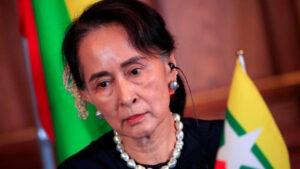Home » Commentary » Opinion » Myanmar’s Democracy Worth Saving
· IDEAS@THECENTRE
 For many, the Myanmar coup marked the failure of a democratic experiment. It was a glaring reality that the Tatmadaw (Myanmar’s military junta) had never relinquished power or control and had maintained a shadowy bureaucracy throughout the transition towards a democratic system of governance.
For many, the Myanmar coup marked the failure of a democratic experiment. It was a glaring reality that the Tatmadaw (Myanmar’s military junta) had never relinquished power or control and had maintained a shadowy bureaucracy throughout the transition towards a democratic system of governance.
However, the hope for democracy should not be lost. The United States, Australia and other Asian nations have already made inroads to nurture Myanmar’s fragile democracy and establish strong bilateral relations. Despite the tainted reputation of Aung Sang Suu Kyi, leader of the National League for Democracy (NLD), Myanmar’s democracy is worth saving.
Suu Kyi, once an icon for freedom and democracy, was met with international opprobrium for defending genocidal acts towards Rohingya Muslims in Myanmar — which damaged relations forged with the West. With the revival of a draconian dictatorship in the country, democratic nations could be further isolated from it. This presents an opportunity for China to leverage and expand its power in a region where it has frequently flexed its authoritarian tendencies.
The groundswell of support by citizens for political action against the military is another reason not to give up on Myanmar. The protests there are one of the largest displays of a civil disobedience movement ever seen. There has never been a more fervent pro-democracy movement in Myanmar nor a greater desire for the people’s power.
This level of resistance against the Tatmadaw is unprecedented. In particular, it is a rare show of solidarity by various ethnic minorities that have often been at loggerheads with each other. Ethnic armed organisations have denounced the coup and thrown their support behind protesters. They have paralysed public and private sector services.
The return of Myanmar to military rule is a case of history repeating itself. Yet unlike previous struggles for freedom, the strength of the pro-democratic movement is a window of opportunity for regional governments to act. With sanctions, foreign companies pulling out and aid cuts, ASEAN countries need to coordinate with the West’s current pressure towards facilitating a positive, democratic outcome.
The democratic norms that were fought so hard for in Myanmar, should not be in vain.
Myanmar’s Democracy Worth Saving